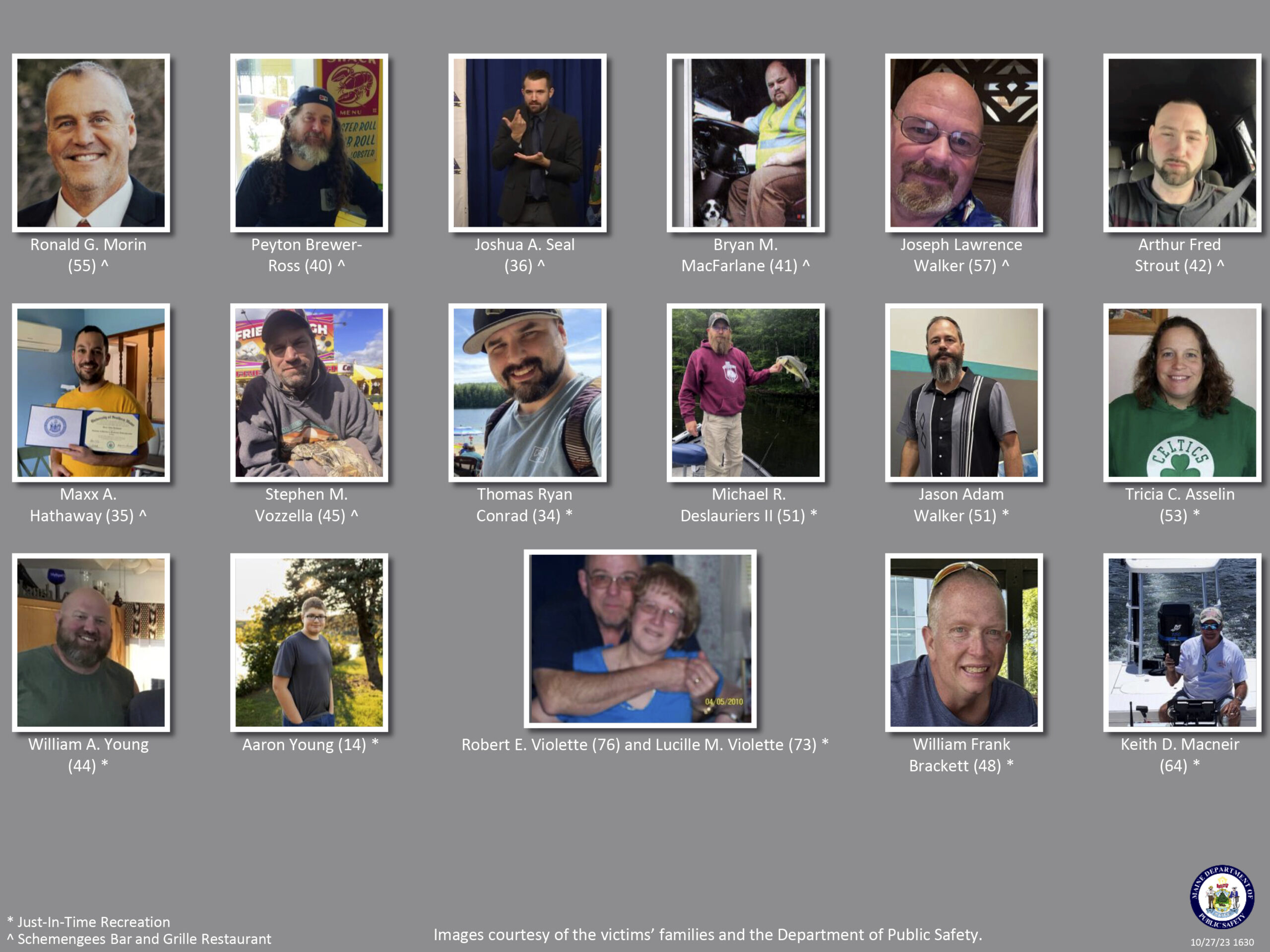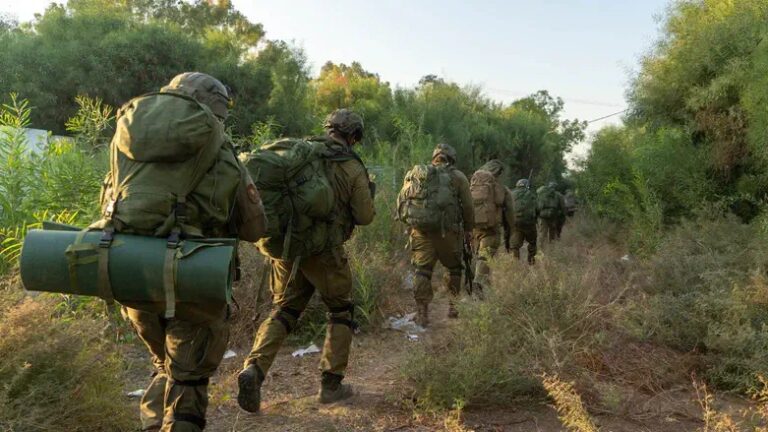The Army reservist who opened fire in a bowling alley and then at a bar in Lewiston, Maine, killing 18 people, was found dead Friday from a self-inflicted gunshot, ending an intensive two-day search that had the state on edge.
Robert Card, a firearms instructor who grew up in the area, was found dead in nearby Lisbon Falls, Gov. Janet Mills said at a Friday night news conference.
“Like many people I’m breathing a sigh of relief tonight knowing that Robert Card is no longer a threat to anyone,” Mills said.
April Stevens, a Lewiston resident who knew one of the victims, said she was relieved to learn that the “monster and coward” who inflicted so much pain was no longer a danger.
“I’m relieved but not happy,” she said. “There was too much death. Too many people were hurt. Relieved, yes, happy, no.”
Maine Department of Public Safety Commissioner Mike Sauschuck said Card was found at 7:45 p.m. near the Androscoggin River, about 8 miles (13 kilometers) southeast of where the second shooting occurred Wednesday evening. He declined to divulge the location but an official told The Associated Press the body was at a recycling center from which Card had been fired.
The official was not authorized to discuss details of the investigation publicly and spoke on condition of anonymity.
Mills said she had called President Joe Biden to alert him that Card was dead.
“Tonight we’re grateful that Lewiston and surrounding communities are safe after spending excruciating days hiding in their homes,” Biden said in a statement. He added that “Americans should not have to live like this” and called on Congress to take action on gun violence.
The deadliest shootings in Maine history stunned a state of 1.3 million people that has relatively little violent crime and had only 29 killings in all of 2022. In Lewiston, the 37,000 residents and those in surrounding communities were told to stay in their homes as hundreds of police officers, sheriff’s deputies, FBI agents and other law enforcement officials swarmed the area.
Card, 40, of Bowdoin, was a U.S. Army reservist. Leo Madden, who said he ran Maine Recycling Corp. for decades, told the AP that Card worked there for a couple of years and nothing about him stood out. Madden said he didn’t remember when Card was employed or whether he was fired or quit.
Last summer, Card underwent a mental health evaluation after he began acting erratically during training, a U.S. official told the AP. A bulletin sent to police across the country shortly after the attack said Card had been committed to a mental health facility for two weeks after “hearing voices and threats to shoot up” a military base.
A U.S. official said Card was training with the Army Reserve’s 3rd Battalion, 304th Infantry Regiment in West Point, New York, when commanders became concerned about him. State police took Card to the Keller Army Community Hospital at West Point for evaluation, according to the official, who was not authorized to publicly discuss the information and spoke to the AP on condition of anonymity.
On Wednesday, Card attacked the bowling alley first, then went to the bar. Police were quickly sent to both locations but Card was able to escape. For the next two days authorities scoured the woods and hundreds of acres of Card’s family-owned property, and sent dive teams with sonar to the bottom of the Androscoggin River.
Law enforcement officials had said they hadn’t seen Card since his vehicle was left at a boat ramp Wednesday shortly after the shootings.
Hours before Card’s body was found, the names and pictures of the 15 men, two women and 14-year-old boy who died in the shootings were released at a news conference.
The victims of the shootings include Bob Violette, 76, a retiree who was coaching a youth bowling league and was described as devoted, approachable and kind. Auburn City Councilor Leroy Walker told news outlets that his son, Joe, a manager at the bar and grill, died going after the shooter with a butcher knife. Peyton Brewer-Ross was a dedicated pipefitter at Bath Iron Works whose death leaves a gaping void in the lives of his partner, young daughter and friends, members of his union said.
The Maine Educational Center for the Deaf said the shootings killed at least four members of their community.
Prior to finding Card’s body, divers searched the water near a boat launch in Lisbon, and a farming business in the same town. At points throughout the day Friday, police vehicles were seen speeding through several towns, lights flashing and sirens blaring.
A gun was found in Card’s car, which was discovered at a boat ramp, and federal agents were testing it to determine if it was used in the shooting, two law enforcement officials told the AP. The officials were not authorized to publicly discuss details of the investigation and spoke on condition of anonymity. Authorities have said publicly that the shooter used at least one rifle. They have not released any other details, including how the suspect obtained the firearm.
Authorities found a suicide note at a home associated with Card on Thursday that was addressed to his son, the law enforcement officials said. They said it didn’t provide any specific motive for the shooting. Authorities also recovered Card’s cellphone in the home, making a search more complicated because authorities routinely use phones to track suspects, the officials said.
The Cards have lived in Bowdoin for generations, neighbors said, and various members of the family own hundreds of acres in the area. The family owned the local sawmill and years ago donated the land for a local church.
Family members of Card told federal investigators that he had recently discussed hearing voices and became more focused on the bowling alley and bar, according to the law enforcement officials who spoke on condition of anonymity. When he was hospitalized in July in New York, Card had told military officials he had been hearing voices and said he wanted to harm other soldiers, the officials said.
Authorities had banned hunting in several communities, in a state where it is immensely popular. However, following confirmation of Card’s death, a public safety alert was issued that announced: “The search is over for Mr. Card. The caution is over. Hunting may resume.”
The Lewiston shootings were the 36th mass killing in the United States this year, according to a database maintained by The Associated Press and USA Today in partnership with Northeastern University.
(AP)












2 Responses
Watch the film Medicating Normal.
Maine has a so-called “red flag law”, of the type the gun-grabbers keep telling us all states should adopt, and yet nobody bothered invoking it despite the explicit warnings. Nor is this the first time that a mass-shooter has not been “red flagged” in a state with such a law. Which leads to the inevitable conclusion that the true purpose of these laws is not to prevent actual shootings, but to harass lawful and sane gun-owners, just like all the other gun-grabbing laws. The purpose is to make gun-owning more burdensome and so discourage people from owning them.
And of course this anti-American governor says Congress should “take action on gun violence”. There is no “gun violence” problem in America; there is a violence problem, and it makes no difference what weapon is used. That is what needs addressing, and piling burdens on a fundamental constitutional right does nothing to alleviate it. And it is not Congress’s job to address it, because it is a local issue, so it’s up to the states and localities to put more resources into mental health and crime prevention.